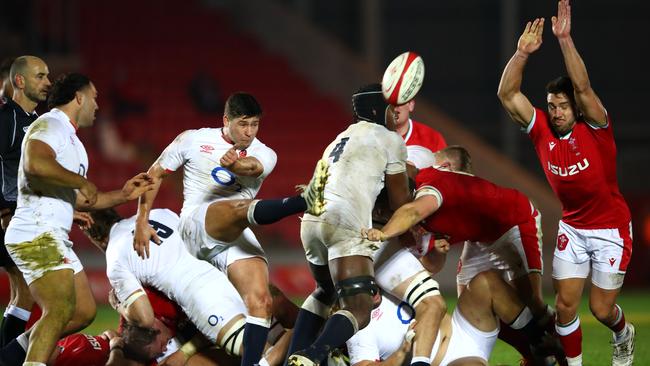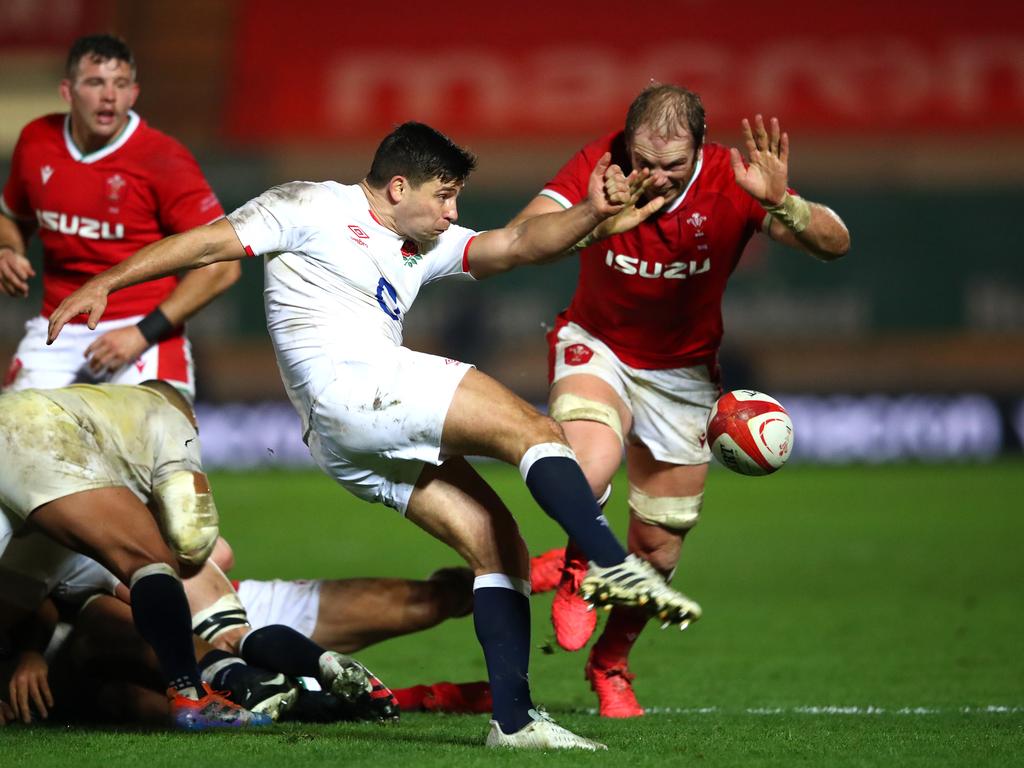Rugby descends into boring kickfests
The international game has become a kickfest that no one wants to watch but World Rugby is asleep at the wheel.

As the major stadiums prepare for the glorious return of the public they should install two dispensers at every entrance — one with the hand sanitiser, the other with the best embrocation for pains in the neck.
What was once known as the handling code has become a ghastly aerial ping-pong, and the strain on the neck muscles of followers as they crane to follow the ball has become intense. As kickfests go, last Sunday’s was the worst yet.
I am not blaming Scotland or France for all the ills, and, especially, I’m not blaming Stuart Hogg, the Scotland fullback. But to see a player so full of attacking quality simply hoofing every long kick he received back into the air to little effect was to fuel the most serious concerns about the direction of the sport. Scotland kept on hoofing even with France only narrowly ahead and the match there to be won.
Eddie Jones, the England head coach, said before the Ireland game that at present the team that kicks the ball the most wins Test matches. Horrible, history-shredding, but true. His own successful team kicked the ball 68 times in total across two Tests in beating a mediocre Ireland and a dreadful Georgia.
There was a time when teams went through endless phases, which was not exactly easy on the eye either, but now no one can be bothered to take the ball through many phases at all.
And everything is way out of kilter. England won easily against Ireland even though they had to make 201 tackles to Ireland’s 76. This indicates strongly that even primary possession is no longer the springboard for anything — if the tactics are going to remain the same, teams need hardly bother with the scrum or lineout if they are going to kick the ball away anyway.
But it’s worse than that. Consider the number of kicks and then remember that the game’s authorities have passed measure after measure to limit this. To make kicks a poor option they have allowed marks to be made in the air; they have allowed any catcher immediately absorbed by the chasers to keep the ball in the next scrum. And yet still the skies are raining ovals.
And how utterly, boringly predictable are the kicks? Take the box-kicks, fast becoming the sport’s anathema. The halfback fiddles around, easing the ball towards the back of the ruck; he looks up two or three times to the blind side to pick his spot; then he waves his guards into position in front of him on the fringes of the ruck; then one more look and he kicks. Predictable. Dull.

And what has happened to counterattacks from the back, in any case? Where is the modern Christian Cullen or Serge Blanco? Alex Goode continually reminded us at Saracens of the possibilities, because with his nous and quick feet at the back he could effectively hold up the ball until his own men got behind him, and off they go on the counter.
The overriding problem has been the new aversion of coaches to try to take the ball through a few breakdowns because, predictably, the new breakdown strictures have passed the rule of unintended consequences. We know that the breakdown was a mess and that some good people got together to lay down the law. Get the tackler to roll away, the tackled player cannot roll over with the ball, and so on.
But because of all the new attention referees realised that it is a key phase in the game, so the effect of the strictures has been that instead of players taking a lead and reacting, referees now believe that they will be seen as having a poor game if they do not award penalties at the breakdown. Coaches have stopped trusting the breakdown and choose to bypass them whenever they can.
Painful to relate, the game is also suffering because of the emphasis on safety. However laudable this is, it has meant the authorities ignoring a galaxy of problems and choke points in the game, because the process of updating all other laws bar those relating to safety has stopped. To great cost. The examples of this are manifold, but probably the key is the depowering for safety reasons of the scrummage.
Now, as soon as the ball is at the feet of the No 8 referees are bawling at him to play it. What happened to those great moments when, with the ball at the back, the scrum powered up to bring on the weight and the second shove?
There is no longer a real confrontation and no longer the chance of pushing the opposition back even by foot, a distance which becomes yards as the defensive team retreat to the back foot and beyond.
The scrummage is now as near to being a simple and denuded excuse to start the game as it has ever been, and that is a disgrace.
The last time the game went barking mad was in the mid-90s. Super Rugby thought that true entertainment was an 80-70 game with a blizzard of tries in which the forwards were simply filling jerseys.
Everything about the game was in the melting pot until Lee Smith, a New Zealander at what was then the IRB (now World Rugby), took charge of the way that the game was played, and he played a huge part in saving it by producing six brilliant principles of law. Among these were the sacred nature of the scrum contest and its importance to attacking rugby; the idea that continuity of possession was less important than continuity of play.
But now he has gone, and the principles that used to be enshrined annually on page 1 of World Rugby’s rulebook have mysteriously evaporated, to be replaced by a mish-mash of new-age drivel.
Frankly there have been times this autumn, staring up into the sky, when you contemplated advocating some real travesty of a change to turn it all around — reducing playing numbers to 13 to take away the avenging flankers; depressurising the ball so it will not travel so long and so high; banning jackalling; banning kicks in the opposition half. Maybe NASA could take over from World Rugby.
All counterproductive measures, no doubt. But the game and its profitability and its appeal will not survive many more afternoons of ball barrages.
THE SUNDAY TIMES







To join the conversation, please log in. Don't have an account? Register
Join the conversation, you are commenting as Logout